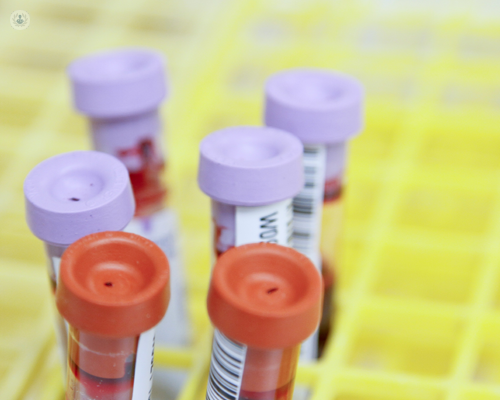Thyroid profile
The thyroid profile is a set of tests designed to assess the function of the thyroid gland and evaluate thyroid hormone levels.

Here's an organised overview of the thyroid profile:
What is being analysed?
The thyroid profile analyses various parameters related to thyroid function, including levels of thyroid-stimulating hormone (TSH), thyroxine (T4), and triiodothyronine (T3).
What does the result mean?
The results of the thyroid profile provide valuable information about thyroid function and hormone levels. They help diagnose thyroid disorders such as hypothyroidism, hyperthyroidism, and autoimmune thyroid diseases.
Why perform the analysis?
The thyroid profile is performed to evaluate thyroid function, diagnose thyroid disorders, monitor thyroid hormone replacement therapy, and assess thyroid health during pregnancy.
When to perform the analysis?
The thyroid profile may be recommended if symptoms of thyroid dysfunction are present, such as fatigue, weight changes, hair loss, or menstrual irregularities.
What sample is required?
A blood sample is required for the thyroid profile.
Is any prior preparation necessary?
In most cases, no special preparation is required for the thyroid profile. However, fasting may be necessary for certain thyroid tests, so it's essential to follow any specific instructions provided by your healthcare provider.
How is it used?
The thyroid profile helps healthcare providers evaluate thyroid function and diagnose thyroid disorders. TSH levels indicate the thyroid's ability to produce hormones, while T4 and T3 levels reflect hormone production and conversion.
What are the normal values?
| Parameter | Normal range |
| TSH | 0.4-4.0 milli-international units per litre (mIU/L) |
| Total T4 | 4.5-11.2 micrograms per decilitre (μg/dL) |
| Total T3 | 80-200 nanograms per decilitre (ng/dL) |
| Free T4 | 0.8-2.8 nanograms per decilitre (ng/dL) |
| Free T3 | Free T3 230-420 picograms per decilitre (pg/dL) |
What do altered values mean?
Altered values in the thyroid profile can indicate various thyroid disorders. For instance, elevated TSH levels may indicate hypothyroidism, while decreased TSH levels may suggest hyperthyroidism. Abnormal levels of T4 and T3 can also provide insights into thyroid dysfunction and help guide treatment decisions.
The thyroid profile is a crucial tool for assessing thyroid function and diagnosing thyroid disorders. If you have concerns about your thyroid health or if your test results show abnormal values, it's important to consult with your healthcare provider for further evaluation and management.